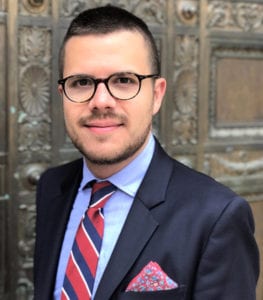Three new assistant professors have joined the Berkeley Haas faculty, with research interests that range from how financial news influences markets to the unintended consequences of mortgage market regulations to developing more accurate ways to predict consumer behavior.
Anastassia Fedyk and Matteo Benetton will join the Finance Group, while Giovanni Compiani will be part of the Marketing Group.
“We’re thrilled to have these three rising stars join us this year,” said Prof. Candace Yano, associate dean for academic affairs and chair of the faculty.
The three new faculty members have already won awards for their research and have published in top journals. As is customary, they will spend the fall semester working on their research and plan to begin teaching in the spring semester.
Assistant Professor Anastassia Fedyk, Finance

For Anastassia Fedyk, coming to Haas is a homecoming of sorts. Though she was born in Ukraine and moved to the United States at age 10, she spent her high school years in Berkeley while her mother earned her PhD in accounting at Haas.
“I really loved living here back in high school, so it was always a dream to move back,” says Fedyk. “And the fact that there are so many people here working in behavioral economics makes it a perfect fit with my work.”
Knowing early on that she wanted to become a research economist, Fedyk majored in math at Princeton and did a two-year stint doing research at Goldman Sachs before heading to Harvard University to earn her PhD in business economics.
Her work spans finance and behavioral economics, and she has pursued three main research threads so far. The first focuses on financial news and how it translates into prices and trading volume in the markets. She’s looked at trading around news events and how the news is presented. “For example, if the news is printed on the front page that will prompt a much faster price response than if it’s less prominent,” she said. Or, when two old news stories are reprinted together, they are perceived as a new piece of information.
Her second line of research centers on present bias and procrastination. She’s found that although people fail to recognize these tendencies in themselves—and really do believe they’ll follow through on their plans for a new gym routine or diet—they easily recognize them in others.
Fedyk’s third line of inquiry looks at how employees’ skills relate to companies’ performance, working with a large dataset of resumes from a startup that collects public profiles. She has found that companies with an unusually high focus on sales-oriented skills tend to outperform, while companies that are heavy on administrative and bureaucratic personnel tend to do worse.
She will be teaching core finance in the evening & weekend MBA program.
Assistant Professor Matteo Benetton, Finance

Matteo Benetton also feels a kinship with Berkeley, although he had only spent three days here interviewing before moving 5,500 miles this month from the U.K, where he completed his PhD at the London School of Economics.
“The vast majority of Italian economists study at Bocconi, which is a private university, but I went to the University of Pisa’s Sant’Anna School of Advanced Studies, which is public,” said Benetton, who originally hails from Treviso near Venice. “I love the idea of a high-quality public university, and the research mindset that goes with that. That’s something I value a lot. Plus, after six years in London I’m looking forward to some sunshine.”
Benetton, whose work centers on the intersection between competition in the lending market, mortgage product design, and regulation, says he was excited to find so many faculty at Haas who share his interests, both in the Finance and Real Estate groups.
Benetton’s research has shown that some banking regulations put in place after the global financial crisis have had unintended consequences, giving more advantages to big banks over smaller banks. “The regulation can actually distort competition, and increase market concentration,” he said. In one paper, Benetton recommended that regulations apply evenly to big banks and smaller lenders, to prevent established banks from gaining additional advantages.
He has also researched how innovative mortgage product design can benefit consumers and prevent the buildup of risk in the housing market. He’s looked at shared-equity mortgages, in which a government or bank lender provides a homebuyer with part of the down payment but takes some of the equity. These profit-sharing contracts can reduce risk, but homebuyers who expect prices to go up tend to avoid the since they don’t want to share the gains.
While much of his work has been focused on Europe, with his new proximity to Silicon Valley Benetton says he’s interested in exploring how fintech is changing banking and payment systems, as well as branching out into household finance.
Benetton will be finishing up a research project this fall and will begin teaching finance in the undergraduate program in January.
Assistant Professor Giovanni Compiani, Marketing

Giovanni Compiani is also a native of Italy, who comes to Haas via Yale University, where he earned a PhD in economics. He’s looking forward to opportunities for working across disciplines at Berkeley, and also to the proximity to Silicon Valley and its trove of consumer data.
“Being at a business school and at Berkeley in particular, there’s a more question-oriented approach—rather than a focus on methods it’s about ‘What real-world question do we want to address?’”, Compiani said. “At Yale, I acquired a rich set of econometrics and structural methods tools which I now look forward to applying. There are so many relevant topics in the digital economy, and at Berkeley an economist can work with a computer scientist and say something very meaningful and interesting.”
Compiani grew up in Bologna before studying economics at Italy’s prestigious Bocconi University in Milan. He completed part of his master’s at Yale and returned for his doctorate.
He has focused much of his research so far on consumer behavior, building a model that gives more flexibility than established models allow for in predicting consumer reactions to price changes. “Let’s say a tax is levied on a supermarket. The market could lower the price of products to keep the final price to consumers unchanged, or they could pass on the full increase to consumers. The best strategy depends on knowing how consumers react,” he said. “This model relaxes certain strict assumptions typically made for ease of programming, and thus delivers more robust results.”
Compiani is also investigating patterns of how consumers search across different product characteristics, such as price. “Understanding these patterns has implications both for policy and for firm strategy,” he said.
With the possibility of increased access to data sources from Silicon Valley companies, Compiani is interested in exploring new lines of research on how concerns about data privacy influence consumer behavior.
He will begin teaching marketing analytics in the undergraduate program in the spring.